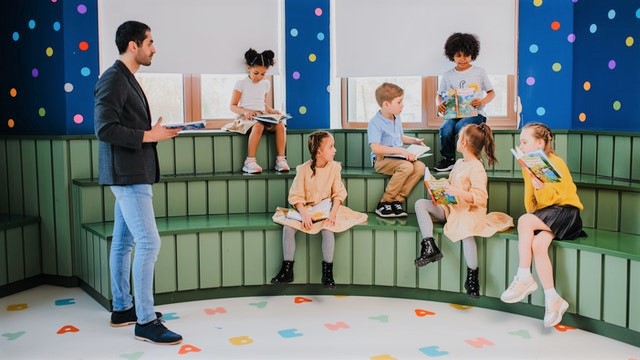
Reading and storytelling with babies and children are always healthy for the development of the brain and imagination. We should teach our kids to read books because it develops language and helps to strengthen relationships. In this article, we will explain how reading affects kids’ behavior.
Early Childhood and the Importance of Reading
Children from the age of 1½ to 3 years will have to:
- Read stories to babies.
- Try to use words to say what they see, touch, or do.
- Begin to use their hands to interact and explore books, picture books, songs and nursery rhymes.
- Connect emotions to language by imitating sounds and actions.
- Imitate the actions of animals by imitating the movements of the animals.
- Recognize basic animals, basic objects, objects and people.
- Be able to name basic objects and some colors.
- Use a few words to tell what something is, like a bicycle or an umbrella.
- Read, sing and play simple songs.
- Act out the actions and noises of the characters in stories and nursery rhymes.
- Begin to recognize people in stories, songs, and nursery rhymes.
- Express themselves and use emotions and facial expressions to tell stories.
Why Reading is Important
Reading encourages vocabulary development, imagination, socialization, and creativity. Reading habit is also part of brain development and the process of learning new social skills. It stimulates the parts of the brain that process words, numbers, parts of speech, and storytelling. Reading helps develop all other parts of a child’s brain as well. It has many benefits including better focus, concentration, and academic achievement.
Interacting with an infant or young child through simple stories and songs promotes learning in many ways. Here’s how to read to a baby and young child. Play/sit with your baby on a blanket, set up toy shelves and floors for him to move between, and let him be imaginative and explore.
Promotes Brain Development
Why is it important to read with your baby?
By spending time reading to children, you are actively stimulating the brain. Brain-stimulating activities are designed to engage certain areas of the brain that help them grow and develop. Dr. Ann Steiner in her book ‘Read-a-Babies’ advocates that you should look at the book while the baby looks at it. Try to see the story through the eyes of the child. If you can, try and sing the story back to the child.
Reading is a great way to develop a love of language and to learn how to talk. Reading helps children learn the sounds of words and how to put words together. A child who is not read for at least 15 minutes a day will have trouble with words, speech, and conversation.
Promotes Imagination
Do your babies and children love to look at books, puzzles, stuffed animals, toys, and even videos?
Maybe you’ve noticed that your babies and children look at things all the time. Sometimes this look may be a sign that your baby or child is thinking hard and trying to figure something out. Imagination is a large part of the learning process and the acquisition of language, as babies and young children use their imaginations to learn about the world.
Try to teach your kids to read books Read in this way you can help your baby. Help your baby or child connect new things to familiar things by using familiar images and stories.
Develops Language Skills
Reading stories that are age-appropriate for your child is a great way to help strengthen vocabulary and language skills. When your child is a little older, the stories are full of different characters and adventures. The characters may change, but the story continues in the same way.
We should teach kids to read books because it develops language understanding and polishes their social behavior. The language skills that are improved the most when reading books.
Sharing Books and Stories with Children
A storyteller who is able to read to children but has not mastered language will have a lot to offer. Listen to the storyteller carefully so that you understand every word and every thought in the story.
Listen to how stories are presented by the people around you.
- Is the story being told in a tone of voice or is it being read off a piece of paper?
- or is it being told to the child or the listener?
- Is it being told in a rhythm or does it skip at regular intervals?
- Is there a rhythm to the words or do the voice and the words have no rhythm?
- and Is there a rhythm in the meaning of the story?
- Is it clear from the story?
- And finaly, is it clear to the listener?
The speaker should make every word clear and should emphasize words that are important.
Tips for Reading with Babies and Young Children
Let your baby “help” you read by turning the pages or patting the pages gently. This builds a connection between you, your baby, and books.
Read a book as you go along, rather than starting at the beginning. Your baby will follow along on the book more easily. Use a finger and thumb to turn the pages. Don’t do it with your whole hand, as that can be too heavy for your baby. Don’t “cheat” and skip words. They are often missed by the younger child. Look for words that will build your baby’s vocabulary, such as “cat,” “car,” “beach,” or “train.”
Before bedtime, read a story. Your baby should be familiar with bedtime stories. Use familiar songs, stories, and rhymes such as “The Wheels on the Bus,” “I Love You,” “When You Were Little,” or “The ABCs.
Conclusion
These are some basic points which can help all parents to teach their kids to read. Kids always like to learn something new. Their learning skills are always very sharp. Parents should facilitate their kids in order to get maximum learning output. The interaction between kids and parents counts a lot for their learning and personality development. Kids get encouragement when they interact with their parents. So, parents’ and kids’ interaction plays a pivotal role in the development of their personality and social behavior.



Pingback: The Best Fun Literacy Activities For Children - Kitab Center
Pingback: Why Books Are Better Than Movies: Some Reasons - Kitab Center